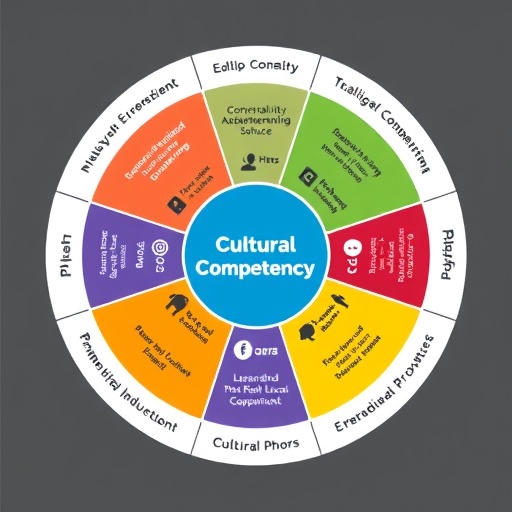In a groundbreaking study slated for publication in 2025, researchers R. Skaria, J. Rivero, and M. Dino have put forth an innovative model named the “Cultural Competency Wheel.” Their exploration into cultural competency, particularly within the nursing profession, highlights the increasing need for healthcare professionals to be adept in multicultural understanding and communication. As the healthcare landscape diversifies, it is paramount for nurses and medical practitioners to possess the skills to deliver care that is not only technically sound but also culturally informed.
The study employs an integrative review methodology to synthesize and analyze existing literature surrounding cultural competency in nursing. This approach allows for a comprehensive examination of the many facets that influence cultural understanding and the attributes necessary for effective communication with patients from diverse backgrounds. The Cultural Competency Wheel serves as a conceptual framework aimed at delineating these critical domains, contributing to the overall advancement of nursing practices in multicultural settings.
At its core, cultural competency encompasses awareness, knowledge, and skills that healthcare professionals must develop to effectively interact with patients from various cultural backgrounds. This effort goes beyond mere acknowledgement of diversity; it necessitates an understanding of the socio-political dynamics that can affect patient care and health outcomes. The Cultural Competency Wheel posits that by identifying and strengthening key attributes within this framework, healthcare practitioners can improve their interactions and ultimately enhance the quality of care provided.
As the world becomes increasingly interconnected, with migration patterns shifting and global communication enhancing, healthcare systems must adapt responsively. The Cultural Competency Wheel proposed by Skaria and colleagues is poised to become an essential tool in training and education programs for new nurses, allowing them to frame their understanding of patient care through a cultural lens. The model delineates various attributes that can help nurses identify their strengths and areas for growth in cultural competency.
One of the most significant contributions of this research is its emphasis on an integrative framework that not only highlights individual competencies but also encourages a systems-oriented approach. In doing so, the authors underscore the importance of fostering an institutional culture that prioritizes cultural awareness and sensitivity. Nursing schools and facilities must adopt these integrated competencies to ensure that all healthcare providers are equipped to meet the diverse needs of their patients.
Research shows that a lack of cultural competency can lead to miscommunication, misdiagnoses, and a failure to provide adequate care for patients from non-majority backgrounds. While training programs for cultural competency exist, the production of standardized, evidence-based models like the Cultural Competency Wheel has been lacking. This study aims to fill that gap and create a foundational tool that can be utilized universally across nursing education programs.
The authors acknowledge that cultural competency is a multifaceted construct that cannot be limited to a single approach or metric. Instead, it requires continual assessment and engagement with the communities being served. The model presented aims to encourage healthcare providers to engage in self-reflection concerning their biases and assumptions. Thereby, enhancing not just technical skills but also emotional intelligence, which plays a critical role in patient-provider relationships.
In addition to practical applications within nursing, the implications of this research extend to policy-making. As healthcare systems strive towards inclusivity, a standardized model of cultural competency can help guide legislative decisions regarding healthcare access and equity. The Cultural Competency Wheel could serve as a reference point for policymakers looking to promote inclusive practices within healthcare systems.
As healthcare systems, educators, and policymakers work together to implement these findings, the significance of partnerships cannot be overstated. Collaboration across disciplines enriches discussions surrounding healthcare and cultural competency, ultimately enriching the experiences of both providers and patients. This collective effort can bridge gaps within the current care framework, enhancing the functionality of healthcare systems.
Looking ahead, the authors hope their work will empower healthcare providers to not only adopt the Cultural Competency Wheel but also to refine it. Continued adjustments to the model based on practical experiences and evolving patient needs will be crucial for its sustained relevance. The integration of feedback loops in education and practice will ensure that cultural competency remains a dynamic and responsive aspect of healthcare delivery.
The implications of this research can also be seen as a catalyst for broader conversations around equity and inclusion in healthcare settings. As historical disparities continue to manifest within healthcare, embracing a cultural competency framework is one vital step toward dismantling systemic barriers. While the implementation of such frameworks poses challenges, the potential benefits in improving health outcomes and ensuring equitable treatment for all patients are profound.
In conclusion, Skaria, Rivero, and Dino’s research marks an important step in the evolution of cultural competency in nursing practice. Their Cultural Competency Wheel not only encapsulates crucial attributes and domains but also frames a proactive approach for addressing contemporary healthcare challenges. By fostering a healthcare environment where cultural understanding is prioritized, we can move toward a more equitable, compassionate, and effective healthcare system that meets the needs of all its patients.
Subject of Research: Cultural Competency in Nursing
Article Title: Cultural Competency Wheel: Advancing a Model to Characterize the Domains and Attributes of Cultural Competency from Published Nursing Literature via Integrative Review
Article References:
Skaria, R., Rivero, J. & Dino, M. Cultural competency wheel: advancing a model to characterize the domains and attributes of cultural competency from published nursing literature via integrative review.
BMC Nurs 24, 1427 (2025). https://doi.org/10.1186/s12912-025-04033-5
Image Credits: AI Generated
DOI: https://doi.org/10.1186/s12912-025-04033-5
Keywords: cultural competency, nursing, healthcare, integrative review, nursing education, multiculturalism, patient care, equity, cultural awareness.
Tags: Advancements in Multicultural Nursing PracticesCultural Awareness in Medical PracticeCultural Competency in NursingDiverse Patient Care Strategieseffective communication in nursingFrameworks for Nursing EducationInnovative Nursing ModelsIntegrative Review MethodologyMulticultural Understanding in HealthcareNursing Practice EnhancementSkills Development for Healthcare ProfessionalsSocio-Political Dynamics in Healthcare





